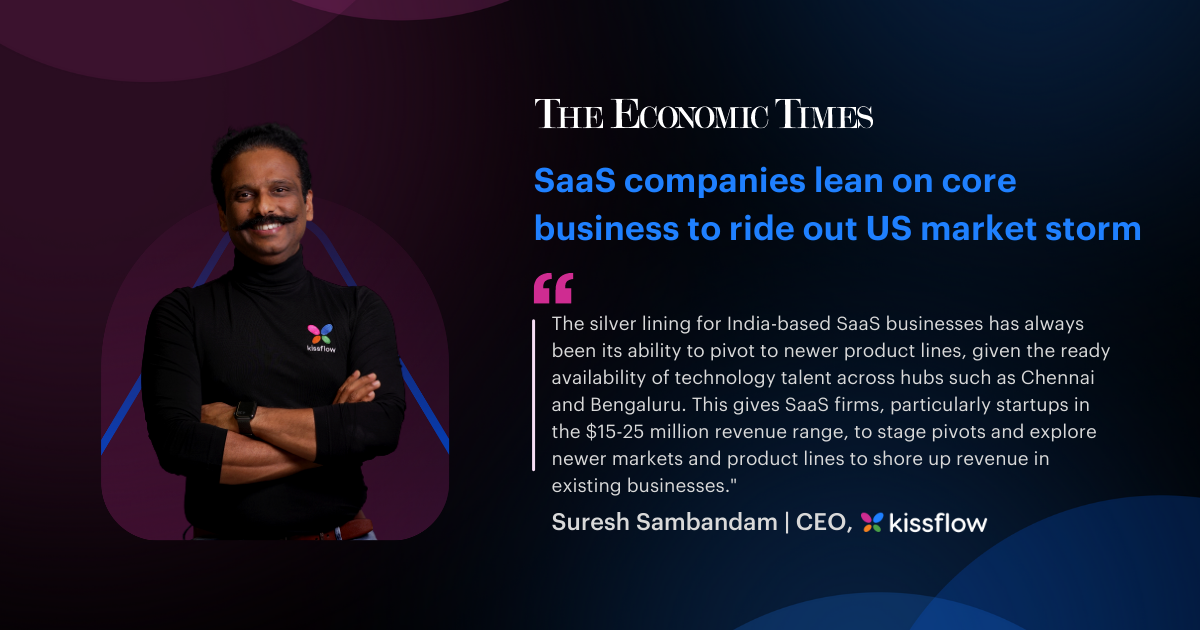Suresh's quote on how SaaS companies weathering US market storm
Spokesperson : Suresh Sambandam

SaaS companies lean on core business to ride out US market storm

Firms turn to ‘efficient growth’ and ‘path to profitability’ as buyers review their spends.
India-based SaaS companies look to ride out the macroeconomic headwinds with judicious spending and sharper focus on core businesses as a recession in the US hits one of the country’s newest technology ecosystems in the form of slower business growth, entrepreneurs said.
Most India-based SaaS products cater to the US market, though some have managed to diversify risk with expansions into Europe, Lat-Am, and New Zealand-Australia markets. Nevertheless, the US carries significant weight in the geographic mix of most SaaS firms, making lower tech spending a key drag on topline growth.
“Definitely, there is a recession in the US and that’s impacting business growth. But it’s also true that B2B SaaS has shown some resilience, as against some venture capital-backed B2C ventures with higher cash burn per month, which have already had to make sharp cuts, including layoffs,” said Siva Rajamani, founder of VC-backed sales commission platform Everstage.
Indian SaaS businesses have perfected the US-focused delivery model, with strong indigenous product development and engineering workforces, and a mix of field and desk marketing teams to compete with global majors such as Salesforce. Large Indian SaaS companies such as Zoho and Freshworks—which is set to close current year with revenue around $495 million —compete with behemoths such as Salesforce and even Microsoft in certain segments, marked as challengers to the current market leaders due to their ability to scale up reliably, and attractive pricing. Nevertheless, the current slowdown is growing to be the first significant test to top line growth for a relatively new space in which 150% year-on-year growth is par for the course.
Automotive tech platform Tekion believes the recessionary pain could last 12-24 months from now, CEO Jay Vijayan told ET in a recent interview. Tekion’s product, including its automotive retail cloud product for dealers, is sold as a SaaS product. Companies may have to tighten spending, including the need to trim marketing budgets. Recently, recurring billing management company Chargebee—valued at $3.5 billion in a February fund-raise of $250 million—has let go of 10% workforce as it corrects spending to suit market conditions and acknowledged need to accelerate ‘path to profitability,’ a new terminology dominating boardroom discussions across VC-backed technology firms.
An entrepreneur, refusing to be identified, said workforce trimming becomes inevitable in a scenario where venture capital-backed firms targeting an IPO need to conserve cash and extend runway until public markets regain lost ground. “There is a significant mismatch between earlier valuations and how the public markets value tech companies in the US now. In view of this differential, companies must hunker down and prepare for a lean period,” the entrepreneur said.
In the US, the tech-heavy Nasdaq composite has lost over 30% year-to-date, a deeper fall compared to other indices with wider industrial constituents such as the S&P 500 (-17.13% year-to-date), and the Dow Jones Industrial Average (-7.26%).
Mumbai-based Netcore Cloud put off its IPO decision to March next year and is focussing on its core market amid a tendency among software buyers to review spends, CEO Rajesh Jain had told ET. Another change in the SaaS model itself is companies letting go of costly-to-serve customers. “I have been speaking to some entrepreneurs who have let go of customers at the lower end of the scale. Earlier they would just focus on topline growth but now, if some of the smaller companies are getting too costly to serve, there is a tendency to let them go.”
Nevertheless, the silver lining for India-based SaaS businesses has always been its ability to pivot to newer product lines, given the ready availability of technology talent across hubs such as Chennai and Bengaluru. This gives SaaS firms, particularly startups in the $15-25 million revenue range, to stage pivots and explore newer markets and product lines to shore up revenue in existing businesses, Kissflow founder Suresh Sambandam said.
Chennai- and San Mateo-based SaaS company Freshworks’ CEO Girish Mathrubootham said the company’s Q3 revenue grew 37% despite a confluence of factors from higher inflation rates to the Russia-Ukraine war wreaking havoc on the macroeconomy. Zoho’s Sridhar Vembu had recently said that the current slowdown could be similar in magnitude to the ‘dotcom burst’, with recovery taking as long as two years.
Analysts say the distinction in measuring impact on SaaS firms lies in their markets of focus. Sharad Sharma, evangelist of product software ecosystem, who co-founded iSPIRT Foundation, a technology think tank, said: "I don't think the SaaS companies focused on the US markets can escape the effects of the demand contraction in the US. Nevertheless, the impact on India-focussed SaaS firms could be lesser, given that the macroeconomic headwinds are expected to be less severe here".
As published in The Economic Times dated November 23rd, 2022.
Our news directly to your email
Thank you for subscribing with us!
Related News
20 May 2019